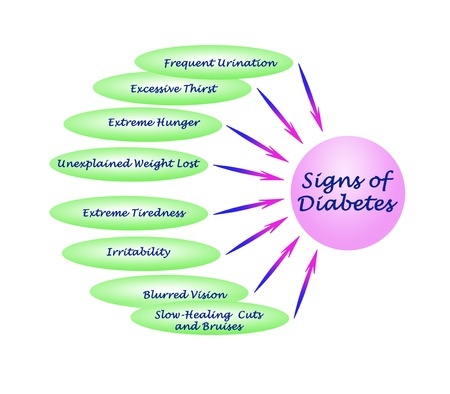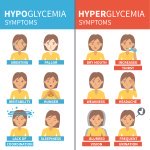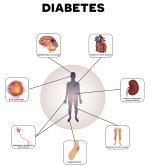Diabetes Warning Signs

The following are diabetes warning signs. Also known as prediabetes symptoms, they are indicators that your body is having trouble managing blood sugar. All of the following warning signs are indications that there is too much sugar in your blood.
Warning Signs Diabetes
Frequent urination
If your body is having trouble regulating your blood sugar, then too much glucose will stay in your blood. Normally, your body will only have around a teaspoonful of glucose in your blood. If your blood sugar goes over this (around 300 mg/dL) you become hyperglycemic, a life threatening condition. Your body will attempt to dilute the sugar in your blood by drawing water out of your cells and into your bloodstream. It will then flush the excess water and sugar out of your body in your urine. The main thing you may notice is that you have to get up a couple times to go to the bathroom at night.
Increased thirst
When your body pulls water out of your cells and deposits it into your bloodstream to dilute and flush excess sugar out of you body, it causes you to become dehydrated. With this diabetes warning sign, the first thing you are likely to notice is that your mouth is dry or that you are constantly thirsty.
Weight gain or loss
Ironically, high blood sugar levels can cause both weight loss and weight gain. People who have a hard time producing enough insulin to shephard glucose into the cells of the body will actually starve these cells causing weight loss. They have plenty of glucose in their blood to provide energy, but the sugar can’t get into their cells to be used because there isn’t enough insulin to open the cell gates and let it in. On the other hand, when there is enough insulin or too much insulin, then excess blood sugar will be stored in fat cells.
Constant hunger
Roller coaster blood sugar levels caused by a breakdown in your body’s ability to regulate blood sugar can make you feel relentlessly hungry. Why? Your brain is a major consumer of glucose in your body and your brain cells require a certain amount of glucose to stay alive. Just a few minutes of low blood sugars (hypoglycemia) can put you into a coma. Because glucose is so critical to your brain, it will send out messages that cause you to feel ravenously hungry any time your blood sugar drops steeply. It isn’t your total blood sugar level that causes this to happen, it is a sharp drop in blood sugar which causes this. In addition, the thirst caused by your body working to dilute the sugar in your blood can also be misinterpreted as hunger. Constant hunger is one of the most misdiagnosed diabetes warning signs, often being attributed to an emotional problem or common menopausal symptom.
Weakness and fatigue
If the sugar in your blood is not getting into your cells effectively as it does when your bodies blood sugar regulation breaks down, then your cells don’t have the energy they need to work properly. This lack of energy at the cellular level will make your muscles feel weak, may cause you digestive problems and ultimately make you feel tired all over. If you start feeling excessively tired after exercise, if you feel too tired to participate in your normal activities and / or if you feel chronically sleepy, you may be developing diabetes.
Tingling or numbness in hands or feet
Neuropathy and other nerve damage is one of the earliest and most devastating diabetic complications. People will often develop symptoms of neuropathy long before they are diagnosed as diabetic. Almost one half of people that are diagnosed with Type 2 diabetes already have detectable nerve damage by the time they are diagnosed.(1) Nerve damage caused by blood sugar levels staying above 140 mg/dL for more than two hours after meals may be one of the major causes of impotence in men.(2) Typically, neuropathy starts in the feet. If you start noticing tingling or burning in your feet, you may be experiencing one of the most common early diabetes warning signs.
Cuts and bruises that don’t heal
Excess sugar gums up your veins and arteries, making your blood vessels less able to transport blood to where it is needed to heal damage. If you start noticing that you are bruising more or that your wounds are not healing as fast as they used to, then you may want to start tracking your blood sugar.
Vision problems
High blood sugar levels can cause blurry vision. Basically, excess blood sugar enters the fluid in the eyeball and changes the optical properties of the eye. Worse yet, when blood sugar stays high, it can cause Retinopathy. Retinopathy has no symptoms but is the result of high blood sugars causing the tiny blood vessels in the retina to grow in a disordered way. Ultimately, these overgrown, disordered blood vessels eventually destroy the optic nerve’s ability to transmit images to the brain, resulting in permanent blindness. One major study discovered retinopathic changes in the eyes in one out of every 12 people diagnosed with prediabetes. Worse yet, these people developed “diabetic” retinopathy even when they did not go on to develop blood sugars high enough to be diagnosed as diabetic.(3)
Yeast Infections and fungus
High blood sugar causes overgrowth of yeast in your intestines. Common diabetes warning signs include frequent vaginal yeast infections, jock itch and athletes foot. If you suddenly start having skin issues and itchiness in the vaginal or groin area or have dryness or cracking between your toes, you may want to start tracking your blood sugar.
Sexual dysfunction
Too much insulin in your blood blood will gum up your arteries. High blood sugar damages your nerves. We already discussed how high blood sugar causes neuropathy above. Not only does this affect the nerves in your hands and feet, but the rest of your nerves are also under attack, including those which control functions like sexual response. The more years you spend with high blood sugars, the more likely you are to develop sexual dysfunction. In addition to nerve issues that effect their sexual response, women can also have vaginal dryness as a result of being dehydrated.
Diabetes Warning Signs
What you can do
None of these diabetes warning signs are things you want to experience. As we have mentioned above, much damage can occur long before someone is actually diagnosed as diabetic. The good news it that there are five important things you can do to prevent becoming diabetic.
- Change your diet - a low carbohydrate diet is proven to help
- Exercise more
- Get at least 7 hours of sleep
- Reduce your stress
- Reduce toxin exposure - stop smoking, limit alcohol, avoid household chemicals
References
Neuropathy
(1) Increased Prevalence of Impaired Glucose Tolerance in Patients with Painful Sensory Neuropathy. Singleton, JR et al. Diabetes Care 24 (8) 1448-1453 2001
(2) The Spectrum of Neuropathy in Diabetes and Impaired Glucose Tolerance. J. Sumner et al. Neurology 2003;60:108-111
Retinopathy
(3) ADA Scientific Sessions: Retinopathy Found in Prediabetes. Elizabeth Thompson Beckley. DOC News. August 1, 2005. Volume 2 Number 8 p. 1
(4) Association of A1C and Fasting Plasma Glucose Levels With Diabetic Retinopathy Prevalence in the U.S. Population: Implications for diabetes diagnostic thresholds Yiling J. Cheng et al. Diabetes Care November 2009 vol. 32 no. 11 2027-2032. doi: 10.2337/dc09-0440



New! Facebook Comments
What do you think? Share your thoughts below...